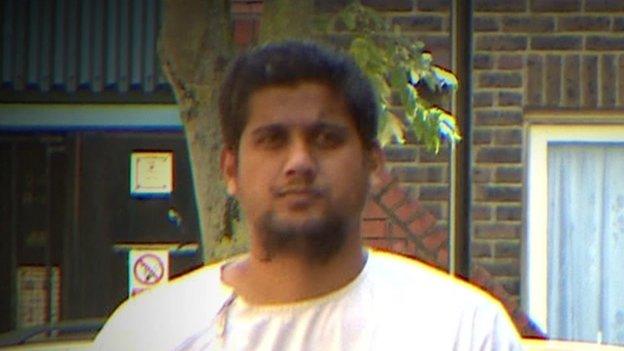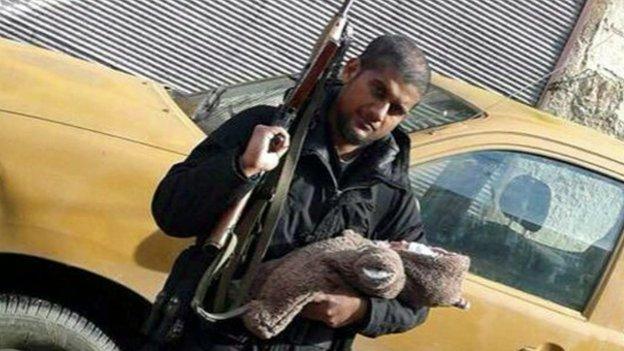Who is Siddhartha Dhar?
- Published

Siddhartha Dhar, also known as Abu Rumaysah, left London two days after he was released on bail in September 2014
Siddhartha Dhar, also known as Abu Rumaysah, is thought to be the new man behind the mask fronting threats to the UK from inside Syria.
Unlike the man he appears to have replaced - Briton Mohammed Emwazi, dubbed "Jihadi John" - Mr Rumaysah was a well-known and prolific figure among radical Islamists in London.
He disappeared in September 2014, shortly after being released on bail while under investigation for allegedly encouraging terrorism.
Police banned him from travelling and ordered him to hand in his passport. However, he boarded a coach for Paris at London's Victoria Station, along with his wife and children.
Weeks later, he announced his arrival in Syria by posting an image online of himself holding a rifle, and his newborn and fourth child.

"What a shoddy security system Britain must have to allow me to breeze through Europe to [IS]," he tweeted.
Mr Rumaysah, who is in his early 30s, was born and raised in the UK in a Hindu family - his original name is Siddhartha Dhar.
Following his conversion in his late teens, he took the name Saiful Islam (Abu Rumaysah is a "kunya", or nickname, which means "Father of Rumaysah"). He became a leading member and speaker for the al-Muhajiroun network, a group banned under terrorism legislation which has frequently organised and operated under different names.
When not providing bouncy castles for parties, he would regularly attend demonstrations against the US, Israel, Arab regimes or any other cause the group believed to be un-Islamic.
He would stand outside mosques on Friday afternoons, seeking to find new followers to the radical network's way of thinking. He would post videos online and rarely turned down an opportunity to speak to the media.
And when he spoke he barely hid his radical views.
When so-called Islamic State claimed to have destroyed the border between Iraq and Syria in 2014, he believed it was the moment a new Islamic regime worthy of global support had been born.
"The caliphate [a state governed in accordance with Islamic law, or Sharia] is a dream for all Muslims worldwide," he said in one of his YouTube videos.
"We can finally have a sanctuary where we can practice our religion and live under the Sharia. It is a big, big thing."
In an appearance on the BBC's Sunday Morning Live programme, he expanded on these views.
"Now that we have this caliphate I think you'll see many Muslims globally seeing it as an opportunity for the Koran to be realised," he said.
"As a Muslim I would like to see the UK governed by the Sharia. It is far superior to democracy. I don't really identify myself with British values. I am Muslim first, second and last."
'Travel guide'
In 2014, Mr Rumaysah was asked by a TV journalist whether he would condemn the killing of US journalist James Foley by IS.
He refused to answer the question - saying only that he condemned US airstrikes killing Muslims in the "caliphate".
In May 2015, he "published" a sort of travel guide for would-be fellow travellers.
The 40-page document, which opens with an image of a fictional battle on the edge of Jerusalem, is designed to encourage Muslims to stop procrastinating and join what Mr Rumaysah claims are the swelling ranks of Islamic State.
Most of the rest of the booklet is devoted to the kind of information that features in a standard travel guide: food, weather and transport.
"If you thought London or New York was cosmopolitan, then wait until you step foot in the Islamic State because it screams diversity," he wrote.
"In my short time here I have met people from absolutely every walk of life, proof that the caliphate's pulling power is strong and tenacious."
He glossed over public executions, rape of women held as slaves and other punishments meted out to anyone who does not adhere to the fighting group's ideology.